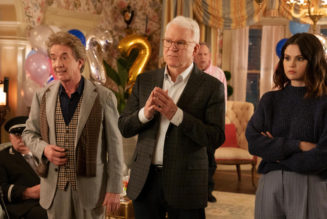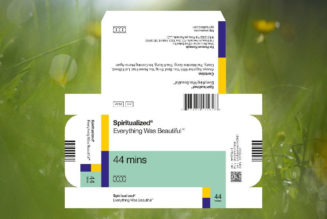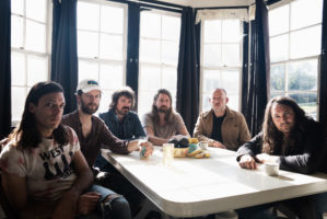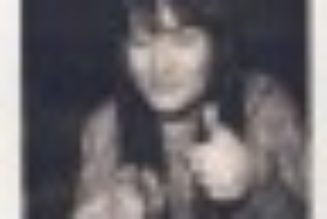
The Lowdown: The 1975 are undeniably divisive. From the start of their roughly 18 years together, frontman and lyricist Matty Healy has generated mass deliberation on whether or not The 1975 are a “serious” band. But that’s typically the case, right? Once something becomes “mainstream,” critics have to re-evaluate, for whatever reason. Can the cult curtains be pulled back to reveal a more substantiated, dynamic legacy? Are fans unanimously delusional to admire a band that talks a lot about crying, erections, and Internet love. I mean, how many times will “she say” something? Spoiler alert: she says a great deal on their latest record, Notes on a Conditional Form. Matty also still cries a lot, too, so don’t worry about that.
But to be fair, the skepticism surrounding the band isn’t unwarranted. Usually, it boils down to Healy’s hammy motormouth. There is a line Healy treads (maybe not so carefully) that meanders between performative provocation and genuine “woke” ingeniousness. But, Healy’s hasty devolution into a controversial Twitter soliloquy is the result of the same super-ego that oftentimes finds itself on The 1975’s albums. For The 1975, there is no definitive separation between the art and the artist. The 1975 are the nexus of Healy’s mind and the jaded rock star character he’s entertained. And if that isn’t your cup of tea, c’est la vie.
Where the hesitation descends into an uncomfortably annoying and borderline elitist territory is when it’s based on the preponderance of The 1975’s fan demographic. It’s hard for me to refrain from quoting the entirety of this Pitchfork article, but I’ll try to sum it up neatly. When teenage girls camp out for a week (only a slight hyperbole) to see an artist, heads shake in suspicion. How can young women know “real music?” Critical thinking is virtually impossible when your main focus is what to wear to homecoming, right? Bands can seem to only be credible if they appeal to the designated judges of quality expression: adult men.
Feminist tirade aside, The 1975 can be silly. “TOOTIMETOOTIMETOOTIME” is a gimmicky pop song, but fun nonetheless. “Nana” makes me grimace in agony; so much so that I completely avoid singing the line “now you’re dead.” And where to begin with their sophomore album title: I Like It When You Sleep, for You Are So Beautiful yet So Unaware of It. But you cannot deny they’re shamelessly ambitious. And Notes on a Conditional Form is exactly that. We can go through their catalog and find deep cuts (see: “Antichrist”), sleepers, and oddly placed interludes, but without a doubt you’ll always find something (in this record’s case, a large number of tracks) that makes you sit back in your seat and go: “Holy fuck, where did that come from?”
Notes is an opus at the same time that it’s an ode to their previous works. Created with the intention of concluding their Music for Cars era (which includes their early EPs and first three albums), Notes still doesn’t really feel like a resolution. Healy frustratedly shakes you to “wake up” to all the world’s fallacies while at the same time yearns to sleep away festering feelings. He even says it himself: “Unconsciousness is my drug of choice.” Notes isn’t a neat bow to tie up this era, but that’s exactly the point: life isn’t like that. But it is a reminder to pay attention: to the world, to yourself, and to arguably one of the best bands in the world right now.
The Good: The three previous 1975 albums have seemed to exhaust all of the typical rock star tropes. After tackling drug addiction, love, lust, and reckoning with fame, it was hard to predict where Notes would fit on that spectrum. With an opening monologue from 16-year-old climate activist Greta Thunberg on intro track “The 1975” (the fourth of its kind, but without the typical “go down/ soft sound” melody) followed by a proto-punk powerhouse anthem, “People”, that tells listeners to pay attention to the debilitating stasis of the world, Notes felt destined to follow the cautionary political agency of their previous album, A Brief Inquiry into Online Relationships. Obviously, it didn’t. It jarringly switches to the orchestral, glittering interlude of “The End of Music for Cars”, which feels like it was copy and pasted right out the penultimate montage of an A24 movie.
Overall, Notes doesn’t have one specific sound because The 1975 aren’t just one type of band. And if you thought A Brief Inquiry… was an experimental risk, Notes will blow you out of the water. There are glimmers of dancehall electronica on tracks such as “Shiny Collarbone” and the Auto-Tune-heavy “What Should I Say”. “Tonight I Wish I Was Your Boy” begins with an pitch-adjusted sample of The Temptations’ “Just My Imagination (Running Away)” while soon diverging into a swaggered, finger-snapping song about a relationship misstep (“I think I fucked it royally”). In between techno tracks are indie-pop bangers like “If You’re Too Shy (Then Let Me Know)”; ’90s Brit-pop remnants “Me & You Together Song”, “The Birthday Party”, and “Then Because She Goes”; and acoustic melodies such as the Phoebe Bridgers duet “Jesus Christ 2005 God Bless America” and “Don’t Worry”, a song penned by Healy’s father when he was a wee youngster.
It’s a lot to digest, but it sure tastes good. Generally, it blends a lot of what we’ve already sampled. You have their teenage angst-ridden debut, ‘80s pop-sounding sophomore LP, and then the more recent culture critique within their third album. Notes purposely fluctuates between these precedents, and then some. There are even nods to previous songs, which isn’t an entirely new trend for The 1975 (see: “Change of Heart”). On folky, banjo-infused “Roadkill”, Healy chastises himself for not applying the instructions he placed on “Robbers”: “If you don’t shoot, then you’ll never know/ I should of learnt that quite a while ago.” He even admits he “never fucked in a car/ I was lying” on piano-driven ballad “Nothing Revealed/Nothing Denied”, seemingly taking back the electric opening lines of “Love It If We Made It”. Healy is obviously unsure of himself on Notes; he’s anxious, apologetic, but always inching toward a “something.” Besides being the most genre-bending collection they’ve released, it’s also the most painstakingly human album in their repertoire.
The Bad: While the bold instrumentation gives the album unabated power, the lyrics on Notes are often less than brilliant. From a 22-track album that is 80 minutes long, it’s surprising that the really memorable lines are few and far between. Especially because these moments are really the bread and butter of The 1975. This could be due to the more stream-of-consciousness structure of the album rather than a tighter, more calculated record. “Playing on My Mind” scratches the surface of what The 1975 are lyrically capable of. The acoustic, more existential song finds Healy asking himself, “Will I live and die in a band/ My consciousness controls my hand” and wanders through fluttered worries of aging, doomed relationships, and an assortment of other “things playing on [his] mind.” “Guys” is also sure to be a live-show winner. Showing his gratitude to his bandmates, Healy sings: “You guys are the best thing that ever happened to me.” It’s easy to imagine fans swaying and repeating the endearing lines.
That’s another piece of the puzzle. Perhaps it’s too early to decide which lyrics are particularly resonant. What sticks with fans is highly subjective, obviously, and cannot be entirely predicted through the first few listens. Yet, I do miss the mirror-to-psyche moments like the infamous “A sycophantic, prophetic, Socratic junkie wannabe.” But like any other 1975 album, the new sound and technique is jarring at first, but then slowly begins to grow on you, ultimately becoming an album that marks a definitive moment in time.
The Verdict: Whether you like them or not, The 1975 are one of the biggest bands in the world right now. I have no residual fear in making that statement as their chart numbers and sold-out arenas speak for themselves. And if you don’t take them seriously at this point, you’re certainly missing out because they’re nothing but serious: seriously intriguing. Seriously (and continuously) interesting. And, more now than ever, seriously important. Notes seethes with paranoia, charges of revolution, and, above all, honesty, providing a semblance of comfort during a, drum roll please, “unprecedented time” that truly affects everyone.
Essential Tracks: “If You’re Too Shy (Let Me Know)”, “Roadkill”, and “What Should I Say”










